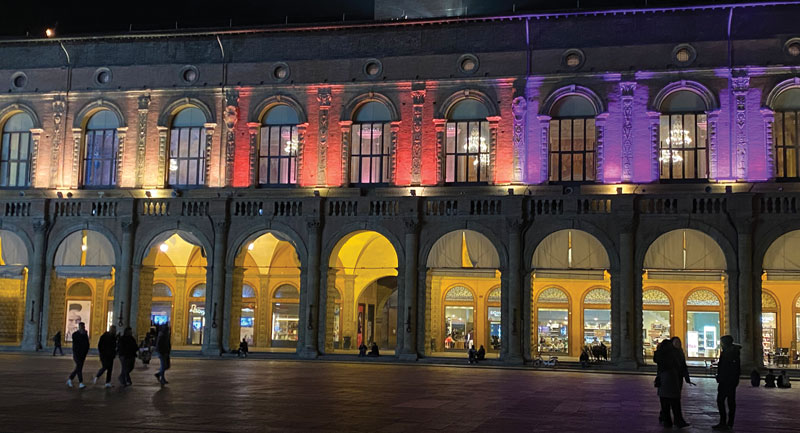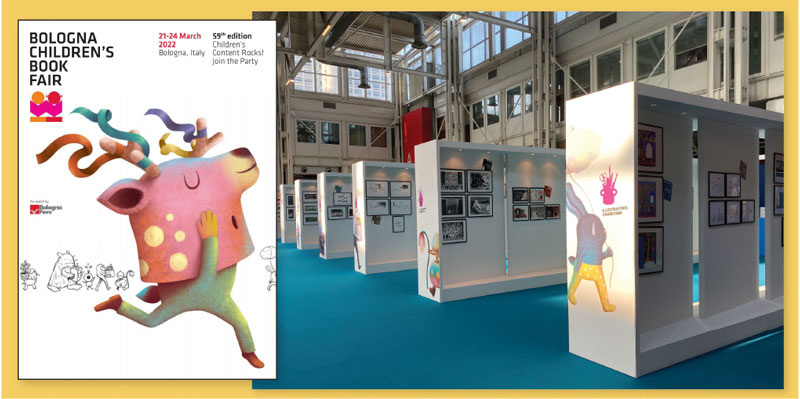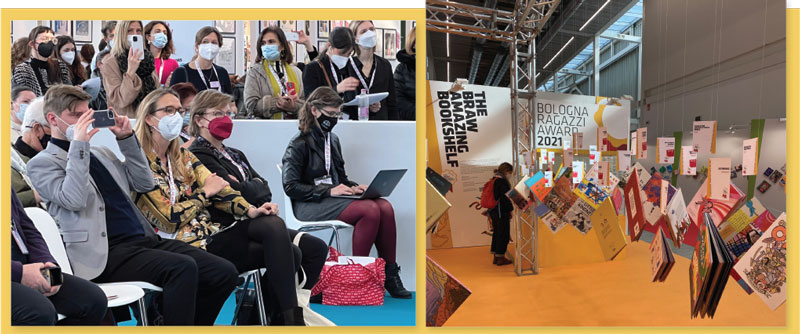State of Global Kid Lit: An Industry Impacted by War, COVID, Is Flourishing
Betsy Bird reflects on the international publishing market via the Bologna Children's Book Fair.
 |
An outside view in BolognaPhotos courtesy of Betsy Bird |
I last attended the Bologna Children’s Book Fair 11 years ago, hauling around a seven-month pregnant belly. Back then, I witnessed an amazing place, filled with books and art wholly different from anything I could find in the States, as I reported in my SLJ article “Betsy Goes to Bologna.” This year at the fair, the world’s largest children’s publishing rights event, I found all of that once again, but in a different way. There were more books from some regions and fewer from others, and the fair is still struggling to be representative in some ways. The war in Ukraine and the pandemic have taken a toll, affecting what was on display, changing how fair officials do their work, and revealing how publishers can be casualties of wartime politics.
Happily, the 2022 fair (March 21–24) was without epidemiological incident, though COVID-19’s shadow was present. Italy’s battle with the pandemic had forced its border to lock down on February 23, 2020, so the 2020 and ’21 fairs were virtual. Little wonder that this year’s in-person attendees clutched their attendance receipts closely, ever wary of another surge and a shutdown once more.
View from abroad
As an American, the first thing you grasp at the fair is the marvelous sensation that when it comes to children’s books, the United States is simply one of many countries present—this year, there were 90. You’ll never feel more superfluous to the world stage than when walking those halls.
Bologna is a rights fair at its heart. Editors, agents, and reps from publishers and other media companies all come to ply their wares on the international stage. For those not interested in the finer intricacies of selling e-rights abroad, there’s still a multitude of events and art to take in. Most panels and discussions are in English, with topics including “Critical Thinking–The Role of the Critic in Promoting Books” and “The Reasons Behind a Choice–Meeting with the Illustrators Exhibition Jury 2022.” With 250 live and overlapping events this year, you could be forgiven for cursing over the several interesting-sounding talks all at the same time.
Then there are the art exhibits. As you come in, there are long white walls where independent artists and illustrators advertise their talents. Past these are the official
exhibits—18 of them by prizewinning illustrators. There’s the Illustrators Exhibition of some of the best children’s book art from around the globe (number of Americans selected = one: Tilda Rose). There are fun exhibits on other topics, like wordless books (called “silent books” in other countries), books that use fluorescent paints, and books that didn’t make the final cut but impressed the judges. This year, books hung from the ceiling on thin strings of plastic, allowing attendees to read through them. Artists who’d won awards in 2020 and 2021 were on display, too.
 |
A poster for the fair; art on display. |
Pandemic vibes
COVID-19 has not released its grip on the fair; that’s for certain. Attendees were almost universally masked, except for the occasional one strolling around with a mask hanging below the nose. Europeans have instituted a Green Pass, easily uploaded to your phone, which they scan for entry everywhere requiring vaccination. By contrast, Americans were pulling out their frayed, paper vaccination cards like Luddites. One person I showed mine to was aghast. “Isn’t America supposed to be where you find all the updated technology? Anyone could fake that!”
Many talks touched on the difficulties COVID-19 has caused when it comes to judging and awards. Members of the Illustrators Exhibition Jury spoke at length about the challenges. This year, 3,873 artists from 92 countries submitted their work for consideration. In years past, the jury would periodically meet in person, spread the art out, walk around, discuss, and determine the most notable. As they were quick to point out, it takes infinitely more time to open individual computer files of almost 4,000 artists and view them on screen. Italian artist and jury member Valerio Vidali said he’d vastly underestimated how many hours this would take from his life. Other juries faced similar challenges.
The pandemic had a far-reaching influence in other ways. Notably absent were most of China’s publishers, and Japan’s. COVID-19 restrictions kept them away, their booths absent, and their books unavailable. The last time I’d attended, Japan was also missing because of the Tohoku earthquake. This year, many South American countries that normally attend were also missing. Practically an entire continent was out because of a single disease.
Other countries were absent from the fair for non-COVID-19 reasons. A display of picture books from Ukrainian artists stood near the entrance. The Ukrainian publishers, for understandable reasons, were unable to attend. A stand in their honor displayed a prominent message urging people to donate to humanitarian causes and bring attention to those unable to attend. During panels, people spoke of efforts to purchase large quantities of Ukrainian picture books to distribute to the refugee children in Poland and other countries. Before the Astrid Lindgren Memorial Award announcement, Sweden’s ambassador to Italy described a small girl, a refugee from Ukraine, whom he’d seen on the news. She was entering a Polish refugee center, a book held tight in her hands. As he watched her reading, he said he knew that she could, if only for a minute or two, forget the horrors around her. “Culture is our first and strongest defense against barbarism,” he said.
Russia was absent as well. Following Russia’s invasion of Ukraine, the fair announced that it had, “with immediate effect,” suspended cooperation with all Russian state institutions in charge of organizing participation in the fair. Considering that Europe had already forbidden all incoming flights from Russia, the move was more symbolic than anything else. Repeatedly, attendees affirmed that Russian publishers and book creators often are at odds with their own government. The director general of the Swedish Arts Council, Kajsa Ravin, stated that the council stands with people who uphold human rights in both Ukraine and Russia. “It is more important than ever to meet and collaborate in an international context,” Ravin said. “Translated literature allows for the exchange of ideas worldwide.” Some said banning Russian publishers rubbed salt in the wound, hurting the very people attempting to change things in Russia for the better.
 |
From left: Bird, lower right, and other attendees; Award-winning books suspended for easy browsing. |
Changes, and what needs to change
To get a better sense of some changes since 2011, I took a look back at “Betsy Goes to Bologna.” I remembered the world was emerging from a different kind of crisis then. The 2008 housing crash had global economic consequences, including on publishing. Yet Publishers Weekly editor Diane Roback was on the record saying, “Things are looking up.”
Back then, exhibitors from Africa and South America had a minimal presence. Only Senegal, Zimbabwe, and Egypt were present from Africa, because of political upheavals in the region. This year, it was a pleasure to see more programming focused on publishing in African nations. Businesses from South Africa, Tanzania, Zimbabwe, Rwanda, Ghana, Ethiopia, Egypt, and more had books on display; the discussion “In Their Own Words: Storytelling to Protect Vanishing African Languages” was one of many focusing on books and publishers from African countries.
 The contrast with South America could not have been more stark. While books in Spanish, from Spain, abounded, there were no panels about South American publishing and few if any booths.
The contrast with South America could not have been more stark. While books in Spanish, from Spain, abounded, there were no panels about South American publishing and few if any booths.
There were other gaps, too. I had difficulty finding children’s books with LGBTQIA+ content from other nations. Curious, I turned to translator and children’s author Lawrence Schimel for answers. Schimel is the author of the board books Bedtime, Not Playtime! and Early One Morning, which faced suppression in Russia and Hungary in 2021 for their depiction of loving gay parents. (He may have gotten the last laugh, since there are now 46 editions in 37 languages.)
“I do think there has been less representation over the last few years, especially at the younger ages,” Schimel said. “Some publishers, like Vydavnytstvo, who published the picture book Maya and Her Moms, written by Larysa Denysenko and illustrated by Masha Foya, obviously couldn’t attend because of Russia’s invasion of Ukraine.”
Schimel added that the United States and Canada were probably the countries producing books with the most LGBTQIA+ content. Walking the aisles, I did spot one from a British publisher, The Big Book of Pride Flags by Jem Milton, due out stateside in June.
Looking ahead
In the end, the Bologna fair boasted 1,070 exhibitors from 90 countries, including the guest of honor, Sharjah. The United Arab Emirates city hosts the annual Sharjah Children’s Reading Festival, and Bologna honored the work that people do to promote children’s literature there. True, registered attendance at Bologna was 25 percent lower than in 2019, but that still meant 21,432 visitors came in the end.
Here’s hoping that in the future we’ll see the return of publishers currently affected by a senseless war. Here’s hoping we see representation from nations still in the grip of the pandemic. Here’s hoping we see more LGBTQIA+ books from around the world, and that they find their audiences.
And here’s hoping that more Americans come to see the fair for what it really is: an opportunity to expand our expectations and awareness of the global community of children’s literature.
Betsy Bird blogs at “A Fuse #8 Production.”
RELATED
The job outlook in 2030: Librarians will be in demand
The job outlook in 2030: Librarians will be in demand
ALREADY A SUBSCRIBER? LOG IN
We are currently offering this content for free. Sign up now to activate your personal profile, where you can save articles for future viewing





Add Comment :-
Be the first reader to comment.
Comment Policy:
Comment should not be empty !!!